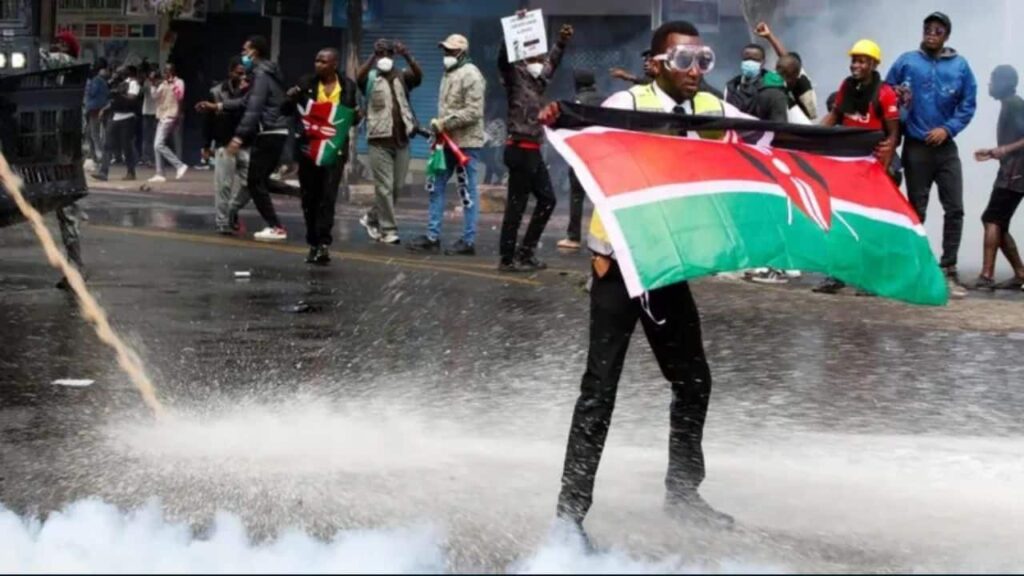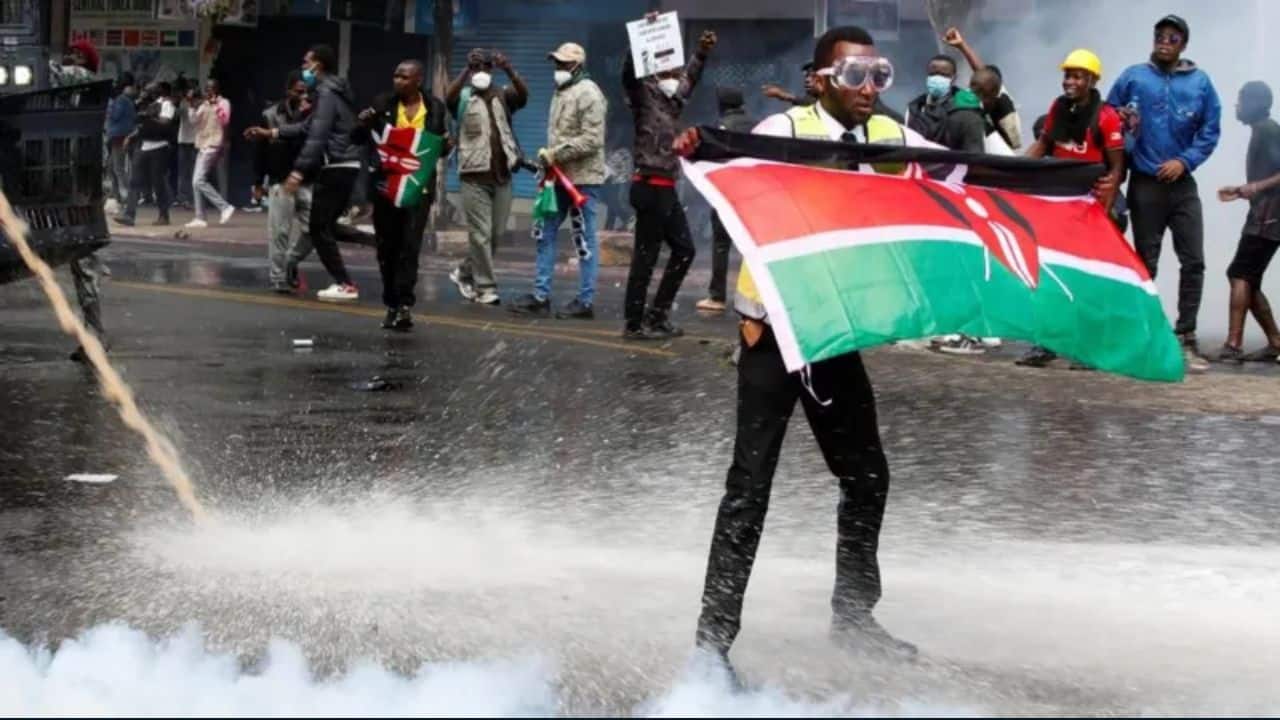Kenya tax proposals, Kenya finance bill protests, William Ruto tax policies, Kenyan economy, tax on basic items Kenya, eco levy Kenya, specialized hospitals tax, higher import fees Kenya, Kenya protests 2024, Kenyan public outcry
“Explore the controversy surrounding Kenya’s latest finance bill and the widespread protests it has sparked. Learn about the specific tax proposals, the public’s reaction, and the broader implications for Kenya’s economy and governance. Discover why Kenyans are protesting and what the future holds for these controversial measures.”

What are Kenya’s Controversial Tax Proposals?
The recent uproar over Kenya’s controversial finance bill has highlighted significant public dissent, leading to violent protests and the tragic deaths of at least five individuals. The unrest reached a peak when part of the parliament building was set on fire. Protesters argue that the bill imposes unbearable tax hikes on citizens and businesses already grappling with a high cost of living. Despite some government concessions, the protesters demand the complete withdrawal of the bill.
What Did the Original Bill Propose?
Taxes on Basic Items
One of the most contentious aspects of the initial bill was the proposal to introduce a 16% sales tax on bread and a 25% duty on cooking oil. These taxes were seen as direct hits to the cost of essential goods, which would exacerbate the already high cost of living for many Kenyans. Additionally, the bill included plans to increase the tax on financial transactions and introduce a new annual tax on vehicle ownership, amounting to 2.5% of the vehicle’s value. The public outcry against these measures was swift and loud, leading the government to announce the withdrawal of these specific proposals.
The Eco Levy
Another significant provision in the bill was the eco levy, a charge on products that contribute to waste and environmental harm. Critics argued that this levy would lead to higher costs for essential items, such as sanitary pads, which are already unaffordable for many girls who consequently miss school during their menstrual periods. Babies’ nappies would also be affected by this levy.
Initially, the government intended for the eco levy to apply broadly, including on digital products like mobile phones, cameras, and recording equipment. These products are crucial for many Kenyans’ livelihoods, particularly in the digital economy. Following public backlash, the government suggested amendments to limit the eco levy to imported products only.
Measures That Remain Untouched
Tax on Specialized Hospitals
The finance bill includes a 16% tax on goods and services used directly and exclusively in constructing and equipping specialized hospitals with a minimum bed capacity of 50. Many Kenyans fear that this could result in higher healthcare costs. Despite these concerns, the chairman of the parliamentary finance committee, Kuria Kimani, has dismissed claims that the bill would adversely affect cancer patients as “falsehoods.”
Higher Import Fees
Another untouched measure in the bill is the proposed increase in import taxes from 2.5% to 3% of the item’s value, to be paid by the importer. This proposed increase follows a reduction from 3.5% to 2.5% just a year ago. Protesters argue that this hike would lead to increased prices for imported goods, further straining the finances of ordinary Kenyans.
Why Did the Protests Escalate?
The protests escalated on Tuesday when MPs passed the controversial bill, although some of the most contentious measures were removed. The protesters broke through police lines and stormed the parliament building, setting part of it on fire. Police responded with live ammunition, resulting in the deaths of at least five people and hundreds of injuries. A BBC reporter on the scene witnessed dead bodies in the streets.
Western countries have expressed concern over the violence and have urged calm. President William Ruto had previously promised to address the protesters’ concerns, but the escalation of violence suggests that these promises were not sufficient to quell public anger.
Why Are Protesters Still Angry?
Despite the removal of some controversial proposals, several unpopular measures remain, including the higher import tax. The protests, however, reflect broader frustrations beyond this specific bill. Many Kenyans feel betrayed by a government they believe is indifferent to their struggles. President Ruto’s argument that Kenyan taxes are relatively low compared to other African countries has failed to convince the demonstrators, especially given a history of unpopular tax laws introduced by previous finance bills.
What Happens Next?
With the bill now passed, President Ruto has 14 days to either sign it into law or send it back to parliament with proposed amendments. The government could consider other measures to alleviate public pressure, such as deferring the bill, although this is seen as unlikely.
Broader Implications and Public Sentiment
The current unrest reflects a broader discontent with the Kenyan government’s handling of economic policies. President Ruto’s administration has faced criticism for not addressing the fundamental economic challenges facing ordinary citizens. The protests signify a deep-seated frustration with governance and economic management, extending beyond the specifics of the finance bill.
Historical Context and Government Response
Kenya has a history of public protests in response to government policies perceived as unjust or burdensome. The current situation is reminiscent of past demonstrations against similar economic measures. The government’s response to these protests will be crucial in determining the country’s political and social stability in the coming months.
International Reaction
The international community has expressed concern over the violence and the government’s handling of the protests. Diplomatic missions and human rights organizations have called for restraint and dialogue to resolve the crisis peacefully. The situation in Kenya has drawn attention to the broader issue of economic inequality and governance in Africa, with implications for international relations and economic policies.
Conclusion
The controversial tax proposals in Kenya’s finance bill have ignited widespread protests, highlighting the country’s economic challenges and governance issues. While some measures have been dropped, significant public dissatisfaction remains. The protests underscore a broader discontent with the government’s handling of economic policies and the perceived disconnect between political leaders and ordinary citizens. As President Ruto decides the bill’s fate, the response will be critical in shaping Kenya’s economic and political future.
The article provides an in-depth look at the key aspects of the finance bill, the public’s reaction, and the broader implications for Kenya. The situation remains fluid, and the outcome will significantly impact the country’s socio-economic landscape. As the international community watches closely, the need for a balanced and fair approach to economic policy in Kenya has never been more apparent.
Read More
